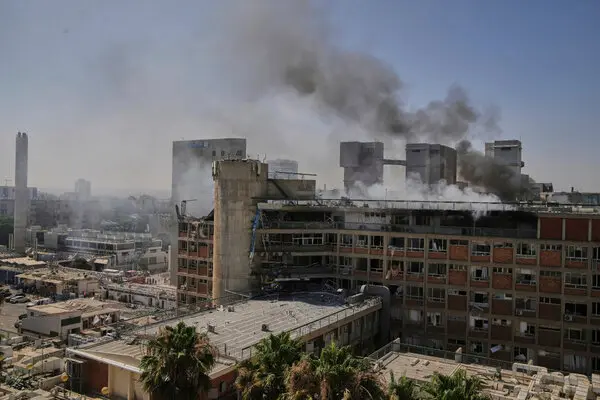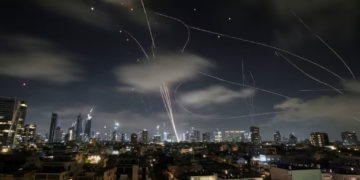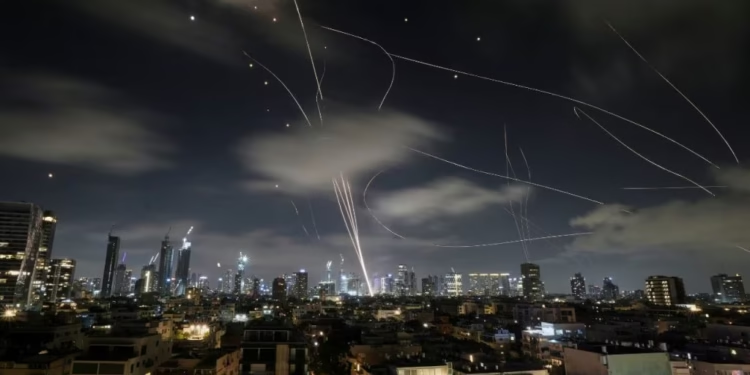From a devastating hospital missile strike to rising calls for Ayatollah Khamenei’s ouster, here are 10 key updates in the escalating Iran-Israel conflict.

The conflict between Israel and Iran has entered its seventh day, marked by escalating military exchanges and mounting casualties.
The hostilities began when Israel launched a series of preemptive airstrikes under the codename Operation Rising Lion, targeting more than a dozen sites across Iran. These included nuclear facilities, senior military figures, and prominent nuclear scientists. Israeli officials stated that the operation aimed to disrupt Iran’s alleged pursuit of nuclear weapons, which they view as an existential threat.
In response, Iran has launched multiple waves of ballistic missile and drone attacks against Israeli cities, targeting both military and civilian locations. According to available reports, Israel’s strikes on Iran have resulted in over 240 fatalities, including at least 70 women and children. In contrast, Iranian attacks on Israel have reportedly killed at least 24 people.
Iranian Missile Hits Soroka Hospital in Beersheba
An Iranian ballistic missile struck the Soroka Medical Center in Beersheba, southern Israel, causing significant damage to a surgical facility within the hospital complex. The hospital, which provides care to over one million people across diverse communities, had largely evacuated patients in advance due to prior warnings. Several individuals sustained minor injuries. Emergency teams quickly responded to the scene as smoke was seen billowing from the affected building.
Iranian Missile Strikes Injure Over 240 in Israel
At least 240 people were injured during Iranian missile attacks across Israel on Thursday morning, according to Israel’s Health Ministry. Most of the injuries were classified as light. Over 70 of the wounded were linked to the strike on Soroka Hospital in Beersheba. Four individuals were reported to be in serious condition.
The Israel Defense Forces (IDF) have carried out an airstrike targeting Iran’s partially completed heavy-water research reactor located in Khondab, commonly referred to as the Arak facility. According to Iranian officials, the site had been evacuated prior to the strike, and no radiation threat has been reported.
Tehran had earlier notified the International Atomic Energy Agency (IAEA) of its intention to begin operations at the facility by 2026. In addition to the reactor, the airstrikes reportedly targeted other strategic military locations, including sites involved in centrifuge production and weapons manufacturing.

IDF Reports Major Blow to Iranian Missile Infrastructure
IDF spokesperson Brigadier General Effie Defrin stated that Israeli forces have destroyed approximately two-thirds of Iran’s missile launchers during a week of intense military operations. Despite the damage, Iran still retains more than 100 operational launchers. The announcement follows a sustained barrage from Iran, which fired over 450 ballistic missiles and deployed hundreds of UAVs aimed at both military and civilian targets across Israel.
India to Evacuate Citizens from Israel Under ‘Operation Sindhu’
India has announced plans to evacuate its nationals stranded in Israel, extending the scope of ‘Operation Sindhu’—which was launched a day earlier to bring back citizens from Iran. In a statement, the Ministry of External Affairs (MEA) confirmed that Indian citizens in Israel who wish to return will be assisted through the same operation. The evacuation will involve travel by land out of Israel, followed by flights back to India.
Israeli Defence Minister Calls for Elimination of Iran’s Supreme Leader
Israeli Defence Minister Israel Katz has called for the removal of Iran’s Supreme Leader, Ayatollah Ali Khamenei, following the recent strike on Soroka Hospital. Speaking at an event in Holon, near Tel Aviv, Katz accused Khamenei of directly orchestrating attacks on civilian sites, including hospitals, and described him as a fundamental threat to Israel’s survival. Katz stated that Khamenei “can no longer be allowed to exist.”
According to earlier reports, U.S. intervention had previously dissuaded Israel from targeting the Iranian leader directly.
Iran Accuses IAEA of Bias Amid Nuclear Compliance Dispute
Iran’s Foreign Ministry spokesperson, Esmaeil Baqaei, has accused the International Atomic Energy Agency (IAEA) of showing bias and aligning with Israel’s interests. The criticism came in response to a recent IAEA report that accused Iran of failing to meet its nuclear obligations. Tehran claims the timing of the report—released just before the outbreak of the current conflict—demonstrates the agency’s complicity in what it described as Israel’s “war of aggression.”
Iran and Kremlin Warn Against U.S. Intervention
Table of Contents
Iran’s Deputy Foreign Minister, Kazem Gharibabadi, issued a stern warning, stating that Iran has “all necessary options on the table” should the United States directly intervene in support of Israel. He urged Washington to maintain neutrality, cautioning that any involvement could provoke a strong Iranian response. Meanwhile, the Kremlin echoed similar concerns, warning that U.S. military action could trigger a “terrible spiral of escalation” in the region.
US Moves Military Assets to Enhance Protection Amid Iran Tensions
The United States military has relocated aircraft and naval vessels from Al Udeid Air Base in Qatar and a key naval port in Bahrain—home to the US Navy’s 5th Fleet—as a precaution against potential Iranian attacks. A US official described the repositioning as a routine force protection measure, stressing that American forces have not participated in any offensive operations targeting Iran. President Donald Trump has yet to announce a decision on whether the US will join Israel’s military efforts against Iran. According to reports, he is weighing several options, including Israeli calls for the US to deploy bunker-busting bombs against Iran’s fortified underground nuclear facilities.
Iran’s Missile Capabilities More Advanced Than Expected
The Israeli military has revealed that Iran employed a missile equipped with multiple warheads during its recent attack. This marks a significant development in Iran’s weapons technology, as such missiles are far more challenging to intercept. Unlike traditional missiles that carry a single warhead, those with multiple warheads require air defense systems—like Israel’s Iron Dome—to track and neutralize several targets simultaneously, complicating interception efforts.















 Categories
Categories









